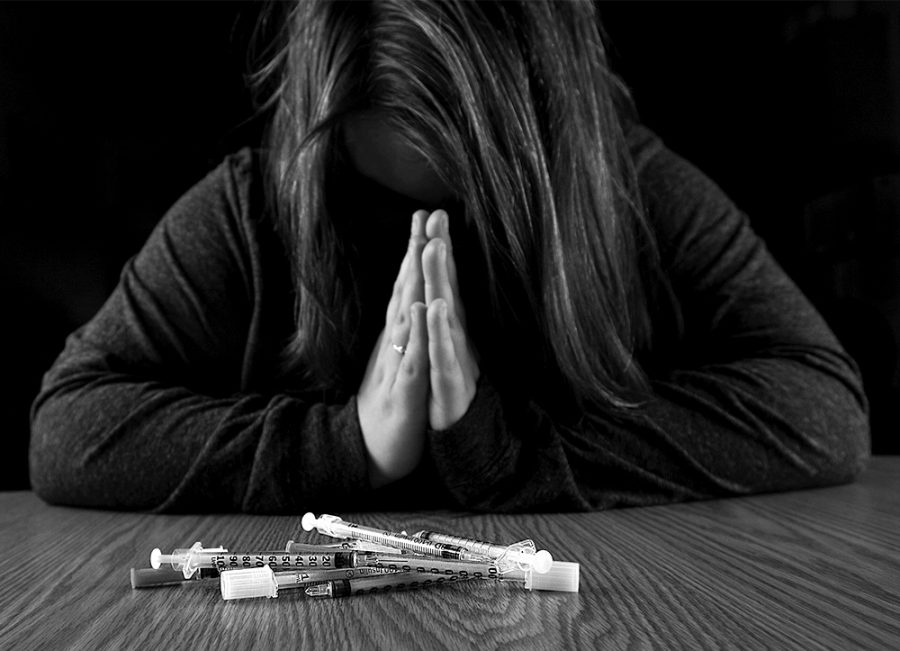Safety group supporting students in recovery
Photo illustration by Jordan Boyer: The newly-formed Collegiate Recovery Student Association is a student-led group where students can share their experiences recovering from addiction. According to collegiate recovery coordinator Emily Won, it is helpful to have support because addiction is so powerful.
February 20, 2019
The Collegiate Recovery Student Association (CRSA), a new student-led organization on campus, provides a safe space for students to talk addiction and recovery.
Collegiate recovery coordinator Emily Won said she describes the CRSA as a “safety group” on campus where students can talk about their experiences recovering from addiction.
The group is open, too, so students who have not suffered from addiction are welcome to collaborate with and support members who have suffered alongside them during meetings, she said.
While the organization is not an official registered student organization, Won said plans to get the group approved as one are in the works.
As of now, the organization is focused on the beginning steps of the establishment of the group, she said.
In April, Won said the group is planning a sober activity for students to attend and learn more about the CRSA while spreading awareness to the rest of the Eastern community.
Additionally, September is Collegiate Recovery Awareness Month, so Won said she would love to see student members of the CRSA organize a sober tailgate near homecoming and get a speaker, someone who has suffered from addiction and has been sober for several years, to talk to students.
There are four elements that make up the entirety of the CRSA’s mission statement, Won said.
“The whole idea, number one, is to provide a safe environment for the students so that they can be engaging in sober activities, and the second one is to raise awareness and the third one is (to) foster (supportive) relationships with friends and family members,” she said.
Being involved in organizations that are a part of the Collegiate Recovery Community, such as the CRSA at Eastern, really do have positive impacts on students in recovery, Won said.
According to the Higher Education Center for Alcohol and Drug Misuse Prevention and Recovery, “92 percent of students who are involved in a Collegiate Recovery Program maintain their recovery.”
There are also scholarship opportunities for students involved with the CRSA, Won said.
According to Eastern’s website, there are two scholarships relating to alcohol and drug recovery: the Recovery Village Health Care Scholarship and the Ammon Foundation Scholarship.
Won said addiction is a very powerful thing, so support from friends can be very helpful.
“(The addictive substance) makes you feel fantastic,” she said, “It makes you feel good. What happens when you take something that makes you feel good? You’re going to want to do it again, so that’s where addiction can easily happen.”
Addiction also has its negative physical and emotional effects that negatively impact people, she said.
Meth can cause a decrease in appetite, resulting in weight loss, steroids can cause acne breakouts in the face and body, snorting cocaine can lead to nosebleeds and damage to nose cartilage and ecstasy can cause dehydration, according to Just Think Twice, just to list a few examples.
Won said the biggest effect she notices in people who are addicted is weight fluctuation.
“Because of the drugs, not particularly alcohol, but some of the narcotic drugs, you can take that and you don’t have to eat for the rest of the day; you’re all good. You don’t (feel like) you have to eat for the rest of the day,” she said.
Students aiming to help friends who are suffering from addiction should keep in mind how powerful addiction really is, she said.
The most important thing to keep in mind when recovering from addiction is resisting the “temptation” to go back to the addictive substance, she said, which is an extremely challenging thing to do.
Won said the Health Education Resource Center is available for any students struggling with addiction or recovery, and she can personally help those people, too.
Logan Raschke can be reached at 581-2812 or at lrraschke@eiu.edu.
















![[Thumbnail Edition] Senior Foward Macy McGlone, getsw the ball and gets the point during the first half of the game aginst Western Illinois University,, Eastern Illinois University Lost to Western Illinois University Thursday March 6 20205, 78-75 EIU lost making it the end of their season](https://www.dailyeasternnews.com/wp-content/uploads/2025/03/WBB_OVC_03_O-1-e1743361637111-1200x614.jpg)




















































